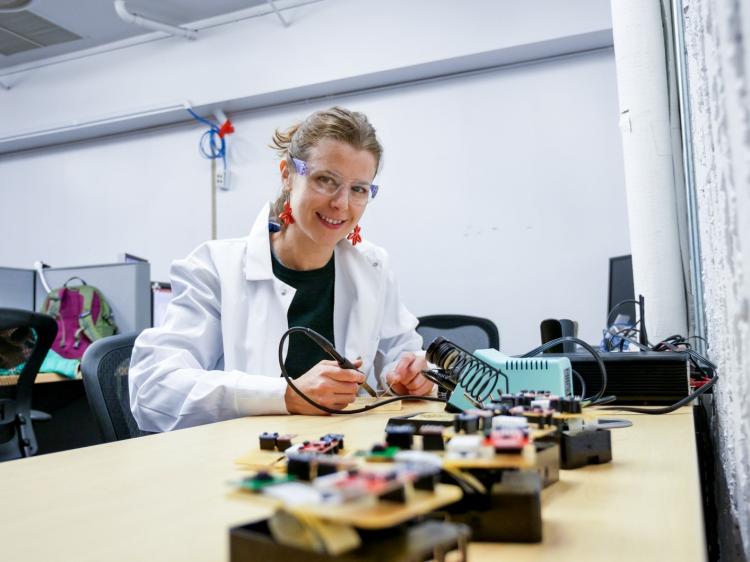Major research center for green building technology launches at CU Boulder

Architectural engineering PhD student Margarite Jacoby working on a board controller.
Header Photo: Two students checking the temperature and pressure settings for a rooftop HVAC unit in the Larson Laboratory.
A major research center for sustainable building technology has been founded at the University of Colorado Boulder.
The Building Energy Smart Technologies (BEST) Center is a new, five-year multi-university initiative funded by the National Science Foundation to advance sustainable building projects ranging from HVAC manufacturing, to smart glazing for windows, building controls, insulation, as well as solar installations.
“This is a long term commitment to solve industry problems and make buildings adaptive,” said Moncef Krarti, director of the center and a professor in the Department of Civil, Environmental and Architectural Engineering. “Many western countries want to be net zero in carbon emissions by 2050. That’s a significant challenge. To achieve that, we need a new set of innovative and smart technologies. We have to combine energy efficiency, reduce demand, and deploy renewable energy into buildings so they can be a net positive, actually producing energy, not just consuming power.”
The project is focused on business collaboration, directing research into areas needed for the construction industry and building retrofits. The new center will operate under the NSF Industry-University Cooperative Research Centers model. This setup is designed to help startups, large corporate partners and government agencies connect directly with university researchers to solve common research obstacles in a low-risk environment. The aim is to develop new technology faster and build out the U.S. workforce in critical areas.
“This will be a really interactive process between industry and universities with what problems to solve. Each project we take on will have an industry sponsor,” Krarti said.
The NSF grant will provide $1.5 million over five years, matched by industry associates for a total of at least $3.0 million. Ten industry partners are already onboard with the initiative.
CU Boulder is the lead for the center, with the City College of New York as a partner site, offering the opportunity research and test new building technologies in the largest metropolitan area in the United States.
The work in New York will be led by Jorge González, Presidential Professor of Mechanical Engineering at CCNY.
“This is a major milestone and opportunity, as it validates our long-term efforts in research and education on building systems as supporting activity to our city,” González said. “We will be providing engineering and technology solutions to connect the outdoors environment to the indoors of buildings to enable smart and sustainable responses.”
In addition to meeting emissions goals, new smart and adaptable technologies in the built environment will provide responses for increasingly frequent extreme weather events due to the rapidly changing climate. The work will also direct attention on emerging challenges in the building sector due to pandemics and health crises such as those caused by COVID-19.
“It’s hard for industry to fund research, but this center is a vehicle to that collaboration. It’s a big deal,” Krarti said. “We spend 80% of our time in buildings. We need to make sure buildings are sustainable and healthy as well as comfortable.”
In addition to Krarti and Gonzalez, other CU Boulder faculty partners include Kyri Baker, Gregor Henze, Wil Srubar, John Zhai, and Wangda Zuo, all in the CU Boulder Department of Civil, Environmental and Architectural Engineering, as well as Michael McGehee in the Department of Chemical and Biological Engineering.

